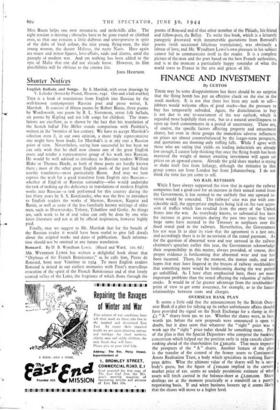Shorter Notices V. Lebeder (SovietAy Pisatal, Moscow, 1942. One and
a half roubles) THIS is a book of translations from English into Russian by the well-known contemporary Russian poet and prose writer, S. Marshak. It consists of fifteen poems by Robert Burns, three poems by Wordsworth, one poem by R. L. Stevenson, seven folk ballads, six poems by Kipling and ten folk songs for children. The trans- lations are excellent, as is shown by the fact that his translation of the Scotch ballad The Miller stands comparison with Pushkin's, written in the 'twenties of last century. We have to accept Marshak's selection even if, in our own opinion, a more truly representative one might have been made, for Marshak's is at any rate a Russian point of view. Nevertheless, seeing how successful he has been we can only wish that he shall now choose one of the great English poets and render a representative group of his work into Russian. He would be well advised to introduce to Russian' readers William Blake or Thomas Hardy, as both of these poets are hardly known there ; most of the other great English poets of the past had their worthy translators—most particularly Byron. And may we here express the wash for a good translator from English into Russian— whether of English or Russian nationality—who would undertake the task of making up the deficiency in translations of modern English works into Russian—a task performed for this country during the last thirty years by S. S. Koteliansky, who was the first to introduce to English readers the works of Shestov, Rosanov, Kuprin and Bunin, as well as some of the less familiarly known writings of older men, such as Doestoevsky; Tolstoy, Tchekhov and Gorky. As things are, such work to be of real value can only be done by one who loves literature and not at all by official inspiration, however highly paid.
Finally, may we suggest to Mr. Marshak that for the benefit of the Russian reader it would have been useful to give full details about the original works and dates of publication. Such informa- tion should not be omitted in any future translation.
Ronsard. By D. B. Wyndham Lewis. (Sheed and Ward. 12s. 6d.) MR. WYNDHAM LEWIS has written a delightful book about that " Orpheus of the French Renaissance," as he calls him, Pierre de Ronsard, born near Ventome in 1524. To most English readers Ronsard is mixed in our earliest memories with Pater's marvellous evocation of the spirit of the French Renaissance and of that lovely scented valley of the Loire, the fragrance of which floats through the
poems of Ronsard and of that other member of the Pleiade, his.friend and fellow-poet, du Bellay. To write this book, which is a leisurely panegyric decorated with innumerable quotations from Ronsard's poems (with occasional felicitous translations), was obviously a labour of love, and Mr. Wyndham Lewis's own pleasure in his subject cannot fail to communicate itself to the reader. It is a complete picture of the man and the poet based on the best French authorities, and is at the moment a particularly happy reminder of what the world owes to France in the arts and graces of life.






























 Previous page
Previous page